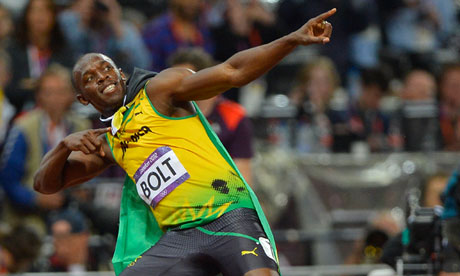
If you're unusually insightful and perceptive, like me, you may have noticed that boastfulness is increasingly socially acceptable these days. Perhaps this helps explain the unhinged gusto with which Usain Bolt declared himself a living legend last week at the Olympics: in a world where every other Facebook status update is a veiled act of self-aggrandisement, the only way to make an impact with your bragging is to push it to the limit. The more everyday kind of bragging – the mock-shy mention of your latest professional achievement, the smartphone photographs of your current holiday idyll, the drive-by name-dropping – is the fuel that powers social media.
Laughing at others' clunky efforts at self-promotion used to be a strictly annual pleasure, confined to the opening of round-robin Christmas letters; now it's a daily chore. This is why, speaking for myself, I try not to add to the problem by engaging in too much boastfulness in public forums. But then I have often been complimented on my restraint – once, indeed, by a rather prominent celebrity, whose name I probably ought not to mention here.
Technology is partly to blame: with so many more channels through which to manipulate one's public image, it's not especially surprising that we are tempted to present ourselves as positively as possible. The filters of social media make things worse. A network such as Twitter is designed precisely to connect you with exactly the kinds of people who don't mind your boasts, while those who might keep you in check won't follow you in the first place: your audience thus serves as an army of enablers, applauding your self-applause. Writing recently in Slate, the literary critic Jacob Silverman complained that this self-reinforcing niceness was damaging his trade, by dissuading people from criticising books they disliked. "It's not only shallow, it's untrue," he wrote, "and it's having a chilling effect on literary culture."
But, as the Wall Street Journal noted this week, in a worried piece headlined Are We All Braggarts Now?, the causes may be economic, too. In the most competitive job market in recent memory, the pressure to portray yourself as better than everyone else is intense. Predictably, there's neuroscientific evidence to undergird all this: self-disclosure activates the same brain regions as eating or sex, according to research by Harvard neuroscientists published recently in the Proceedings of the National Academy of Sciences, though you can bet they mentioned it on their Facebook pages too.
And as bragging grows ubiquitous, it evolves, the better to penetrate the defences of those who would otherwise be too embarrassed to engage in it. Hence the "humblebrag", that staple of Twitter-boasting that deploys self-deprecation in order surreptitiously to draw attention to the bragger's brilliance or privilege. Here's Cheryl Cole: "How can I still be nervous about red carpets after 10 years. Eeek!" And a classic from George Bush's former press secretary Ari Fleischer: "They just announced my flight at LaGuardia is number 15 for takeoff. I miss Air Force One!!"
By now, though, even the humblebrag is growing easy to spot, thereby defeating its purpose, and so it is giving way to a new mutation, spotted and named by blogger Jen Doll: the "underbrag".
Underbragging involves referring to an embarrassing pratfall or stupid error that has no redeeming aspects: it constitutes a "brag" only because you are demonstrating that you can mention it without fear of being fired by your employer, grounded by your parents, or ostracised by your peers. "The underbrag is the new humblebrag," Doll writes, "because it is the brag that doesn't care what The Man thinks, the brag that pulls no punches, the brag that does whatever its braggy little heart desires."
If I mention that I fell asleep drunk on the sofa last night, surrounded by the detritus of a half-consumed McDonald's meal and empty cider bottles, you might not envy me. But that's precisely the point: by telling the world, I'm implying that I don't care that you don't envy me, and that I am secure enough to report my debauchery without needing to contemplate the consequences. Which is why you should envy me.
This is all rather dispiriting, but there's no point in trying to fight the new culture of boasting. Speak out against it and the wrong people will take note: the hesitant, self-conscious self-promoters will retreat, leaving the field to be dominated by the ultra-confident. If we're all braggarts now, at least let's hear not just from the obnoxious hype artists but also from the intelligent, good-natured, likable people. Such as – just as an example, I mean, and without wanting to sound big-headed about it or anything – me.
Why Obama passes the beer test
Another reason to fear a Mitt Romney presidency: he would surely bring an end to the small brewery that, it was revealed this week, operates from inside the White House. President Obama's home-brewing activities came to light after he handed a bottle of White House Honey Ale – made with honey from Michelle Obama's garden beehive – to a voter in a coffee shop in Iowa. "There is a home brew, if you will, at the White House," press spokesman Jay Carney confirmed, in response to reporters' questions. The beer comes in a light and dark variety, he added. "I've only tried the light, and it's quite refreshing."
Since Romney is a committed teetotaler, Obama had already won the classic test of presidential likability – "which candidate would you rather have a beer with?" – this time around. But now we know he'd bring the beer too, which is even better. Or a depressingly socialistic example of government trying to do things best left to private enterprise. One or the other.

